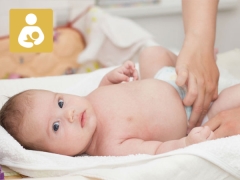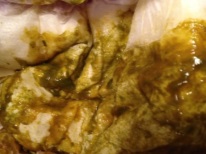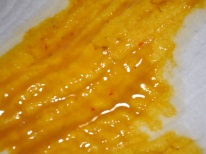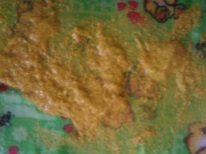Breastfeeding diarrhea
One way to judge whether a child is healthy in the first year of life is to evaluate his chair. Therefore, the mother of an infant should know how a normal chair should look in order to distinguish it from diarrhea in time and call the crumbs of a doctor.
How does it look
A baby’s chair that is only fed on breast milk can be quite diverse in appearance. The reason for this is the immaturity of the baby's digestive tract, and the food consumed by the mother. In the first week of life, baby feces have a dark green color and a viscous consistency. This feces is called meconium and you should not worry if you see such feces in a newborn.
The normal consistency of a baby’s chair older than a week is gruel or creamy. The color of feces can be as light yellow, and with a touch of green. There may be lumps in the stool. All this is normal for a newborn. Since the lactation has not yet been adjusted, the baby can receive more of the front liquid milk, which will make his feces greenish.
Normally, a baby breastfeeding can crap up to 10 times a day. Therefore, it is difficult to distinguish diarrhea from the normal frequency of bowel movements. Parents may suspect diarrhea if the stool consistency of the baby is watery, feces mucus or blood present.
Possible reasons
Dilution and an increase in the frequency of bowel movements of the baby during breastfeeding occurs when:
- Violations of the diet mom.
- Allergic reactions.
- Intestinal infections.
- Dysbacteriosis.
Intestinal infection is not uncommon for infants, since in infants of an early age the protective function of the digestive system is not fully formed. Even those pathogens that do not cause the disease in adults can cause serious infection in the chest toddler.
Loose stools, which have a sour odor, may indicate that the crumb does not digest lactose. Inflammation of the intestines, including those of an allergic nature, can also lead to a lack of lactase production.
Opinion E. Komarovsky - what to eat mom?
A famous doctor recalls that it is often the cause of diarrhea in infants, breast-fed, is mommy's poor nutrition. This applies not only to products that have laxative action, but also possible allergens. Komarovsky encourages nursing mothers to experiment less with nutrition and limit cocoa, citrus, strawberries, coffee and other foods that can act as allergens as much as possible.
According to the doctor, everything that a mother eats is sure to get into her milk. That is why you should not eat foods that can worsen the smell or taste of milk.
As for diarrhea in infants, the use of white cabbage or legumes by mother can make the crumbs stool thinner and more frequent. Trying any product, the mother should monitor the crumbs, and if the baby does not have a rash and the chair has not changed, then you can increase the amount of product in the diet.
What to do?
Parents who suspect diarrhea in the infant should immediately call a doctor or an ambulance for a child. The specialist will determine the causes of this condition and help to quickly deal with it.Before the doctor arrives, parents should resist the dehydration of the crumbs. In no case should you stop breastfeeding.
When should I call a doctor?
It is important to immediately call the infant doctor if:
- Baby poops too often.
- Blood appeared in his watery stool. The presence of blood in the feces indicates trauma to the wall of the intestinal mucosa.
- With bowel movements, the baby cries from pain and arches.
- Crumbs rose body temperature.
- In addition to the liquid stool was vomiting in infants.
How to treat?
The baby should continue to be breastfed. It is important that the child receives enough liquid, so you need to put the crumb to the breast as often as possible. At the same time, a nursing mother should review her diet and exclude products with laxative properties from the diet.
Sometimes it makes sense to feed the baby with special electrolyte solutions. Such solutions must be in the home medicine chest. If the baby refuses to drink these solutions from a bottle, give the liquid from a spoon, pipette or syringe without a needle. It is necessary to give solutions in a small amount in order not to provoke vomiting. Do not drink baby with diarrhea only with boiled water, since the crumb loses not only liquid, but also salt. Add to 1 l. boiled water 1 tsp. without a hill of salt and 5 tsp. sugar, because the replenishment of only lost water can exacerbate the deficit of salts.
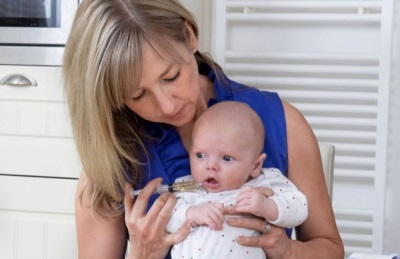
Crumbs can also be given adsorbing agents (smect, enterosgel and others) that will absorb toxins from the intestines. Antibiotics should not be given to the child themselves - only the doctor should prescribe these drugs.
